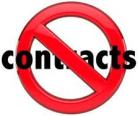Compare Month To Month Versus Prepaid Wireless!
As the no contract wireless market has evolved, more and more people have been increasingly confused over the difference between a postpaid carrier offering, and prepaid wireless plans. And rightly so, as the line between them has been greatly blurred. Here you'll find everything you need to know to understand the differences, including the pros and cons of each.
Postpaid providers by definition require customers to sign a contract; usually two or three years. This allows them to offer you a subsidy on your phone purchase. In other words, they can take hundreds of dollars off of the price of a phone by locking you into a contract that guarantees that you won't leave before they've had a chance to make back their money on the phone.
Most postpaid providers have long since allowed customers to buy an unsubsidized phone (i.e. pay full price) to avoid signing a contract. So instead of paying $100 or $200 (and often times less or nothing) for a phone you could pay the full price (ex. $400-$700+) for the phone. This is usually the same price you would pay if you want to upgrade your phone before the allowable period. While this is an expensive up front cost, you then pay month-to-month, and can cancel your service anytime without an Early Termination Fee (ETF). Note, however, that postpaid carriers have been aggressively phasing out phone subsidies in favor of straight financing or leasing. This is a much lower financial risk and overall liability for carriers.
Prepaid wireless has the same effect of paying a higher price for the phone upfront, while not having a contract. As people have come to have a greater desire to avoid signing contracts, it begs the question, "What's the difference between postpaid month-to-month versus prepaid?" Here I've listed some of the advantage and disadvantages of each model:

Advantage Of Month-To-Month:
- You typically get access to a much wider variety of handsets from postpaid providers. They allow you to buy almost any phone they offer on contract, as long as you pay full price for the phone. On the other hand, if you go prepaid with that same carrier, they usually have a much more limited selection of phones. They do this as they prefer that you sign a contract, so they don't want to provide the same phones and value on their prepaid plans in order to give an edge to their postpaid plans. This is obviously an artificial differentiation that carriers create to promote what they believe is the more profitable postpaid business.
- As you're still on a postpaid plan, you're still subject to surprise overages! So if you go over your voice minutes or your data bucket, you'll be accumulating additional charges that you'll need to pay on your next bill. With a prepaid plan, this is impossible. You pay for particular service(s) and features for a particular period of time. If a given feature is not unlimited, once you consume it, you'll need to pay to get more; you won't have any surprise charges!
- Postpaid carriers tend to charge additional fees, surcharges, and taxes that most prepaid carriers include in the price of their plan (which is overall lower than the equivalent postpaid plan).
Advantages of Prepaid:
- Generally speaking you pay a lower per month cost for the same features you would get on a postpaid plan. Postpaid carriers need to pad the cost of the plan you're on to cover the cost of the Phone Subsidy. So while the upfront cost of the phone may seem inexpensive, and "all you have to do" is sign a contract, you're ultimately paying for that phone over time, and usually the total net cost is more than if you had just purchased it upfront. Also noteworthy is that even though postpaid carriers are now decoupling the plan from phone financing, and no longer subsidizing, the plan cost itself is still priced higher than a prepaid plan.
- You can easily change between prepaid plan types (ex. pay-as-you-go, monthly, monthly unlimited, or between different tiers of monthly plans with different data buckets and features) without too much pain. To the contrary, changing plans with a postpaid carrier can mean an extension of your contract, or other fees and complications moving between plans.
- Despite the fact that over time (ex. 1 to 2 years) you can actually end up paying more for a phone on postpaid (due to the higher plan cost), the upfront cost of a prepaid phone is almost always higher as they have minimal or no subsidies. So while in the long term you're better off with prepaid, the upfront cost of a prepaid phone can simply feel more expensive, or be financially more painful. The implementation of Handset Financing programs largely addresses that pain point. Personally, I detest those programs, and you can read more about my opinion at that link!
- Fortunately, the previous objection around prepaid having a lack luster phone lineup has completely evaporated over the years, so this aspect is no longer an issue!
| Advantages | Disadvantages | |
| Month-to-Month Wireless | -
Subject to overages (i.e. surprise bills!) - Higher monthly plan cost - Higher overall phone cost (over 2-3 years) |
|
| Prepaid Wireless | -
Lower monthly plan cost - Fixed monthly price (i.e. no overages!) - Lower overall phone cost (over 2-3 years) |
- Higher upfront phone cost |
Home
›
What Is Prepaid Wireless?
›
Month-To-Month Versus Prepaid
| Be Heard! Let prepaid wireless providers know what you want; fill out the survey now. |



Comments
Have your say about what you just read! Leave a comment in the box below.